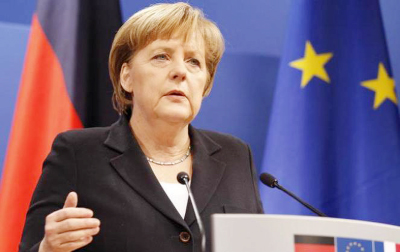
Reuters, Berlin :
The European Union must develop a response to growing global political and economic pressures and this will be the spirit of an EU summit this week, German Chancellor Angela Merkel said on Thursday.
Merkel pointed to the crisis in Syria and the growing importance of Asian economies as needing a European response.
“More than ever we need European answers to the pressing, big questions of our time,” she told Germany’s Bundestag lower house of parliament.
French President Emmanuel Macron in September offered an ambitious vision for Europe, but has had to wait for a response from EU powerhouse Germany, with much on hold in Berlin as Merkel attempts to cement a governing coalition.
In her remarks to the Bundestag, Merkel made clear that the future of the European Union would be a top priority in her fourth term as chancellor, provided the coalition between her conservatives and the pro-European Social Democrats (SPD) goes ahead.
“It is no coincidence that the first chapter of the coalition agreement is on Europe”.
The parties have agreed on a deal but SPD members are voting to approve it, with the result due on March 4.
Merkel also said the forthcoming debate about a new budget for the 27-member bloc after Brexit was an opportunity to rethink the system.
“The debate about the future financial framework is also a chance to look at the finances of the EU as a whole,” she said.
The budget is one of the topics to be discussed at the EU leaders summit this week.
Merkel also sought to reassure some in her party who are more sceptical about deeper EU integration, and in particular about paying out for poorer members.
“The stability and growth pact will remain the compass for Europe,” she said, adding that in future structural funds within the bloc should be linked to the taking in migrants.
“Solidarity cannot be a one-way street,” she said.
“With the distribution of structural funds, we must ensure that the allocation criteria in future reflect the engagement of many regions and municipalities in absorbing and integrating migrants.”
The European Union must develop a response to growing global political and economic pressures and this will be the spirit of an EU summit this week, German Chancellor Angela Merkel said on Thursday.
Merkel pointed to the crisis in Syria and the growing importance of Asian economies as needing a European response.
“More than ever we need European answers to the pressing, big questions of our time,” she told Germany’s Bundestag lower house of parliament.
French President Emmanuel Macron in September offered an ambitious vision for Europe, but has had to wait for a response from EU powerhouse Germany, with much on hold in Berlin as Merkel attempts to cement a governing coalition.
In her remarks to the Bundestag, Merkel made clear that the future of the European Union would be a top priority in her fourth term as chancellor, provided the coalition between her conservatives and the pro-European Social Democrats (SPD) goes ahead.
“It is no coincidence that the first chapter of the coalition agreement is on Europe”.
The parties have agreed on a deal but SPD members are voting to approve it, with the result due on March 4.
Merkel also said the forthcoming debate about a new budget for the 27-member bloc after Brexit was an opportunity to rethink the system.
“The debate about the future financial framework is also a chance to look at the finances of the EU as a whole,” she said.
The budget is one of the topics to be discussed at the EU leaders summit this week.
Merkel also sought to reassure some in her party who are more sceptical about deeper EU integration, and in particular about paying out for poorer members.
“The stability and growth pact will remain the compass for Europe,” she said, adding that in future structural funds within the bloc should be linked to the taking in migrants.
“Solidarity cannot be a one-way street,” she said.
“With the distribution of structural funds, we must ensure that the allocation criteria in future reflect the engagement of many regions and municipalities in absorbing and integrating migrants.”

